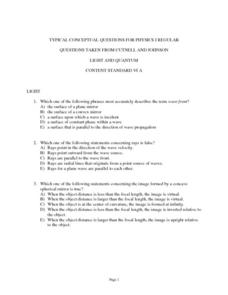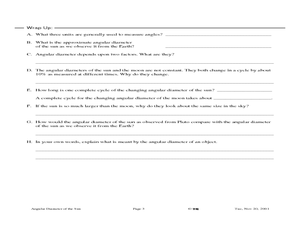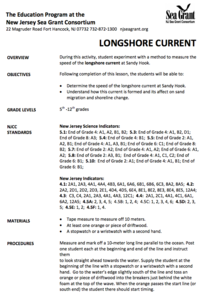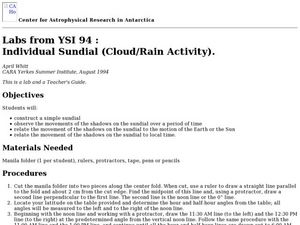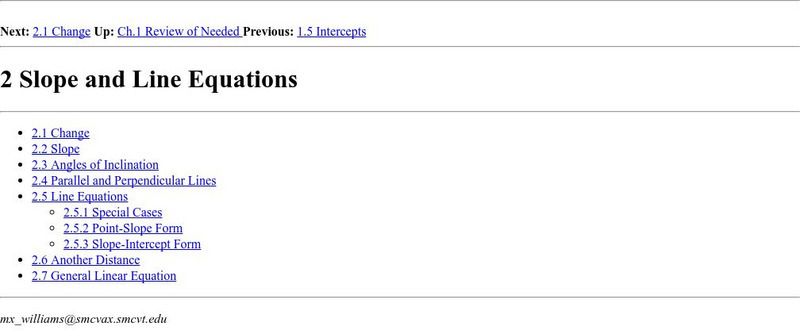Alabama Learning Exchange
Mirror, Mirror on the Wall: Reflections of Light
Why can we see our reflection in a window but not a brick wall? Young physicists learn the Law of Reflection and various light properties that help them answer this and other questions about reflection. Use the PowerPoint to introduce...
Curated OER
Mr. Bo Jangle, What's Your Angle?
Third graders explore angles. In this geometry lesson, 3rd graders identify and define acute, obtuse, and right angles. Students form angles with their bodies, find angles in picture books, and record angles found outside in their math...
Curated OER
New Angle on Forest Ecology
Students measure and calculate the angle of the sun. They compare the leaf types on the north and south to compare the effects of the sun on the type of vegetation. They complete the activities inside the classroom or on a trip to a...
Curated OER
Typical Conceptual Questions for Physics I - Light and Quantum
This is a stellar overview of everything light and quantum! There are 30 multiple choice questions, none of them requiring any mathematical computation. There are a few diagrams to analyze: light rays striking reflective and refractive...
Curated OER
Measuring the Earth
Students use principles of geometry to measure the circumference of the Earth. In this applied geometry lesson, students use mathematics to determine scientific information. They make measurements, calculate the central angle, and...
Curated OER
Angular Diameter of the Sun
Starting with a paragraph of information presenting the different ways we can observe planetary objects, pupils work through these instructions to see how they can observe and measure angles. Your class will discover how these...
Curated OER
Gotham Equinox
By looking at the direction of the parallel streets of New York and figuring which days the setting sun is directly visible along those lines, your class can calculate the degree and angle of the sun. A really nice lesson, giving a...
Curated OER
Optics- The Study of Light
In this optics worksheet, high schoolers read about refraction and reflection, lenses and mirrors, and objects and images. They answer 13 matching questions about light rays, light behavior and types of lenses. They also answer 9...
Curated OER
Longshore Current
Learners are posted at the beginning and end of a 10-meter long line parallel to the ocean and are instructed to look straight ahead towards the water. The student at the beginning of the line uses a stopwatch, goes to the water's edge...
Curated OER
Why do Stars Rise in the East?
In this stars rise in the east instructional activity, students use geometry to show how the Earth rotates from west to east and why celestial bodies appear to rise in the east and set in the west. Students draw a figure and label given...
Curated OER
Optics - The Study of Light
For this optics worksheet, students read about how light can reflect or refract and how lenses and mirrors work. Then students complete 13 matching, 27 fill in the blank, and 8 word problems.
Curated OER
Individual Sundial (Cloud/Rain Activity)
Students make a simple sundial to examine the changes in shadows over time. In this sundial and shadow instructional activity, students make a simple sundial out of a manila folder and pencil. They observe how shadows change over time,...
Curated OER
Wave Terms and Concepts
In this waves worksheet, students define 23 vocabulary words associated with the different types of waves and how waves are measured. Students complete 23 matching terms with definitions and draw the superposition of two waves shown.
Curated OER
Measuring The Earth
Students use their geometry and trigonometry skills to determine the distance between their school and another school.
Curated OER
Acceleration
Students develop an understanding of velocity and to distinguish it from speed. To determine the difference between a scalar and a vector quantity. To explore how acceleration is derived from velocity and time.
Curated OER
Which Wrap Is Wrapped Right?
Students investigate the integrity and strength of different types of food wraps. They test the wraps and create a graphic organizer for the data. Once it is organized then a lab report can be written. The lesson contains background...
Northeast Parallel Architectures Center, Syracuse University
Npac Reu Program: Slope & Line Equations
This site from the Northeast Parallel Architectures Center, Syracuse University has a very substantial discussion of math topics slope & line equations. The outline form is quite useful if you need to zero in on one aspect of...



